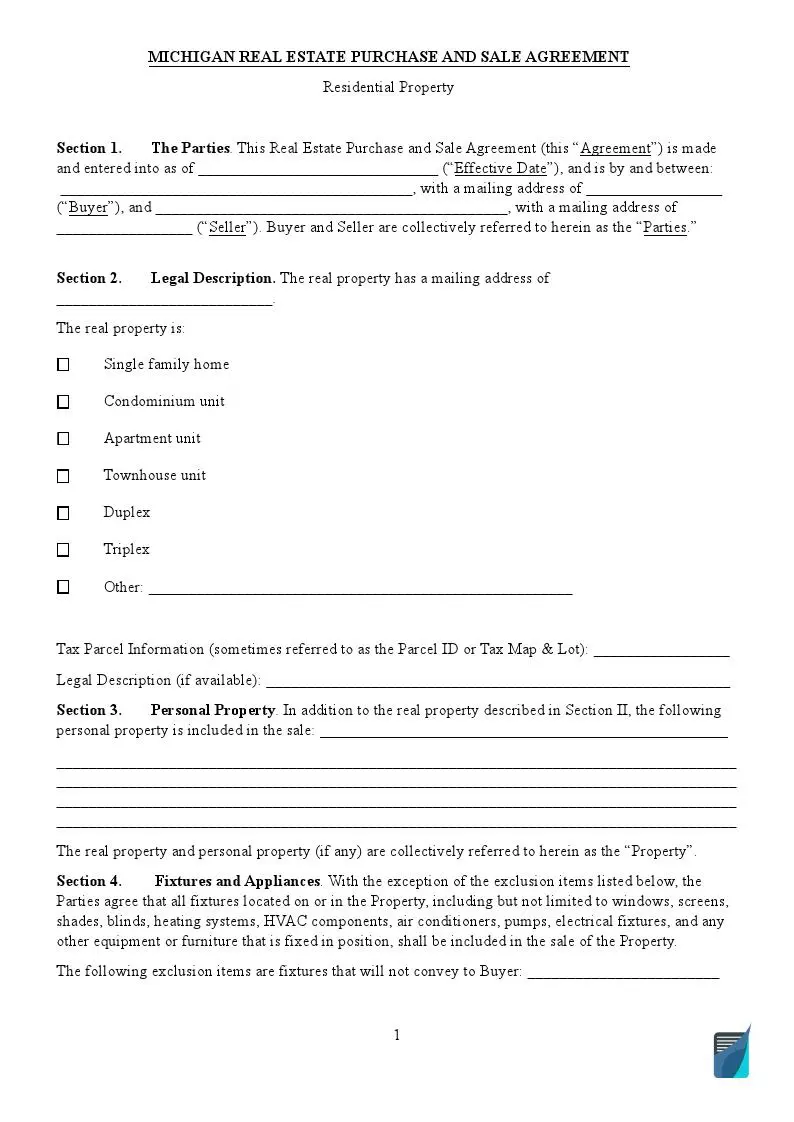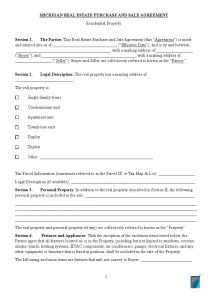Michigan Real Estate Purchase Contract
In Michigan and any other American state, selling or buying a new home or a commercial real property is tied to significant amounts of money and various legal papers for both parties. Amongst others, one necessary form is the Michigan real estate purchase agreement, signed by both deal participants.
The document represents a set of conditions and terms upon which the buyer and seller cooperate during the deal. Signing it is compulsory any time someone purchases or sells real property. Even if you complete the fillable purchase and sale agreement with your relative or close person whom you trust entirely, you still need to sign the official form with a list of all applicable legal conditions and state the selling price and all payment dates.
From this article, you will find out what elements are unavoidable in any real estate purchase agreement, what laws are related to such contracts in Michigan, and what disclosures the seller must pass to the purchaser when they sign the contract. Even though these agreements may seem hard to understand and create, we hope that our quick guide will provide you with plenty of helpful info on the topic.

Build Your Document
Answer a few simple questions to make your document in minutes
Save and Print
Save progress and finish on any device, download and print anytime
Sign and Use
Your valid, lawyer-approved document is ready
Michigan Residential Purchase and Sale Agreement
One should follow certain requirements when drawing the template and signing the Michigan Real Estate Purchase Agreement. It does not matter whether the deal is about commercial or residential property. Either way, there is a set of points you must incorporate in your form. Among them are:
1. Both Parties’ Names and Addresses
Usually, you write them at the very beginning, on the form’s first page. You should provide full names and addresses (with a state and county).
2. Parties’ Signatures
Besides the seller and the buyer, all agents and brokers involved must append their signatures, too.
3. The Effective Date
The contract must be dated from the start; also, it is typical for each signatory to insert the date at the very end, where the signatures and signatories’ names are placed.
4. The Price
Parties agree on a specific price before signing the contract, and reflecting that price in the form is crucial. If any party has a claim regarding the price or amount paid at each step, the other party can show the conditions written in the contract and protect itself from trial.
5. The Schedule of Payments
If the buyer cannot pay all the demanded money right away, the parties create a plan of payments that usually includes the dates and the sums. The buyer must follow this plan after signing the agreement.
6. The Downpayment
Also referred to as “earnest money,” this payment guarantees that the buyer is credible and will pay all the amount in the set terms. The date of this initial payment should also be written in the form.
7. The property Details
Having a real property sale contract is impossible without describing the property being transferred. At least, the parties must indicate the estate’s location (full address) and ID number. Also, ensure that you have determined the property’s type and enumerated all other items that come with the real property in the frames of this deal.
Besides all of the above, you should also include the conditions based on which the real estate is passed from one party to another.
The Michigan Realtors Association has developed a standard form that the seller and buyer can use to transfer or get the real property piece in Michigan. It exists for both commercial and residential properties, and you may correct it in correspondence with your needs. However, we still recommend you to be very careful and hire an agent if possible. Such deals are rather serious and involve significant money, so it is better to rely on specialists with enough expertise.
If you are curious about the laws used in Michigan to manage property matters, you can look through Chapters 554 and 565 of the Michigan Compiled Laws. The statement relates to both residential and commercial property. Further, we will include specific fragments of state laws that sellers and buyers should know.
Michigan Commercial Purchase and Sale Agreement
This form’s structure and requirements are similar; just remember that your contract assumes transferring commercial space, not residential. Sellers should add the inspection period details in the form and allow buyers to see if that fits their commercial aims.
We have already told you about the applicable property laws in Michigan and the local realtors’ association. If you have any doubts, you can always check the relevant chapters of Michigan Compiled Laws. More importantly, turn to the association’s professionals and ask for help.
Required Seller Disclosures in Michigan
Disclosures are a traditional add-on to real property purchase contracts in Michigan and other US states. Estate sellers use these forms to disclose some details about the object of sale. Some disclosures should be provided in all states by default and by law; others are optional and depend on each state’s legislation.
We will now list disclosures mandatory in Michigan when transferring residential and commercial real properties. You can also check the Michigan Compiled Laws, Chapter 565, Sections from 565.951 to 565.966. These sections are united in the Seller Disclosure Act.
Residential Property
Compared to other American states, Michigan does not oblige its residents who sell real estate to prepare that much. You only have to formulate two disclosures and pass them to the purchaser. Here is what you should make:
- Lead-Based Paint Disclosure
If the house or building you plan to sell was constructed before 1978, you should disclose this info to the buyer by Section 4852d of the US Code (Title 42). The thing is that before the mentioned year, people used paint with lead to paint walls and buildings; through time, it was understood that leaving lead traces in the buildings and their decoration might be extremely dangerous for future inhabitants. If you wish to check the year when your property was built, you may turn to the county’s assessor.
- Seller’s Property Disclosure Statement
When you sell your real estate in Michigan, you have to prepare a disclosure that honestly describes the estate’s current conditions and problems (if any). The buyer has the full right to check the property and ask questions about their concerns.
You can read more about this rule in Sections 565.954 and 565.957 of the Michigan Compiled Laws. Moreover, Section 565.957 offers the form you can use to draw your disclosure. You will need to describe many items on your property, from the state of domestic appliances to the water system and air conditioning.
There are also some exceptions listed in Section 565.953. For instance, you should not give this disclosure if you transfer property to your spouse or child. Another exception is when the property is transferred due to a court order. There are nine exceptions in total.
Commercial Property
Section 324.20116 of the Michigan Compiled Laws requires the seller to provide the Hazardous Substances Disclosure when you sell out a specific piece of commercial estate. It is needed only in case such substances were once used on the premises. You must notify the buyer about possible dangerous traces that might affect new people working or staying inside the property.
